One Trick for Mental Clarity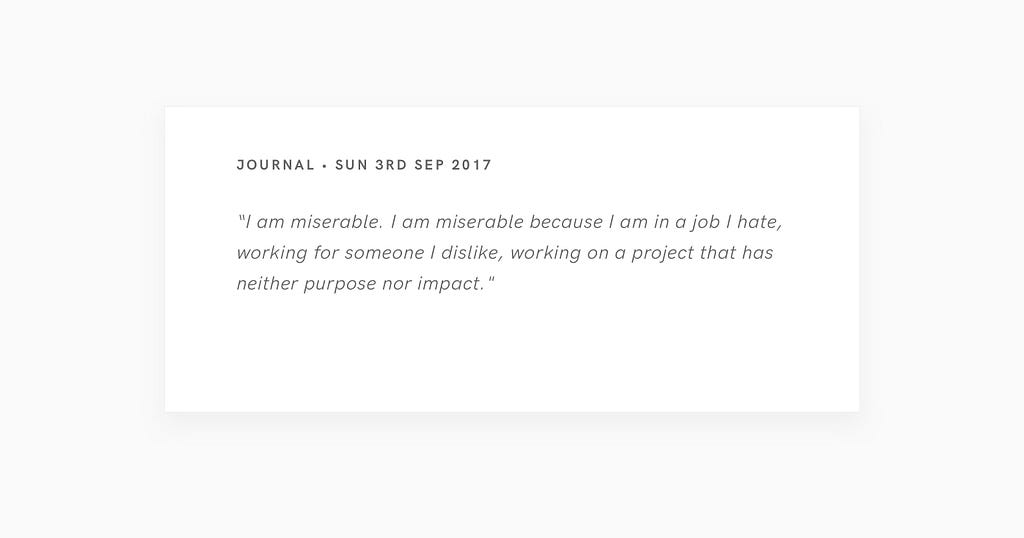
Like many of us, I committed myself to a job I didn’t like, to a team I didn’t respect, in an industry that seemed to do no good.
I put an arbitrary exit date on it to provide a light at the end of the tunnel.

I moved from Lisbon to join a Berlin startup hoping to take a step up professionally from my previous few years’ wandering around the world as a digital nomad.
And I started well in my role as a Product Designer.
I impressed in meetings. Impressed with my visual design work. My ideas. I was told I would quickly make it up the product career ladder. No problem.
And for the first few months, my job became my world. I was learning, I was busy, we were moving quickly.
I got caught up by the excitement that comes from novelty: a new city, new language, new job.
Yet from the first day, there were warning signs that something wasn’t quite right.
Dictatorial decision-making. Tension in team meetings. An insidious corporate culture masked by startup buzz words.
Yet, caught up in my own world, I found myself conveniently ignoring the nagging sensation that something was wrong.
I put my head down. I got to work. I studied German. I partied on the weekends. I repeated the cycle.
Until one day, on the cusp of autumn, I opened my journal, as I had done most mornings for the last three years, & started to write about it.
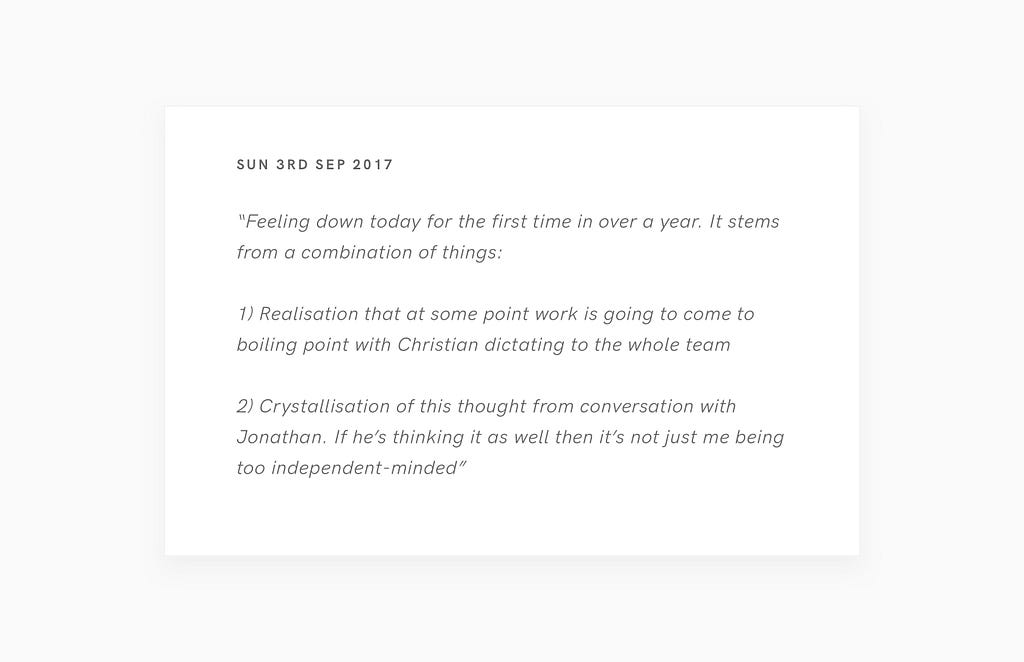
Write at the beginning of this entry, I also wrote down the following:
“I am miserable. I am miserable because I am in a job I hate, working for someone I dislike, working on a project that has neither purpose nor impact.”
And in that moment, all the months of supressed frustration, of listlessness, of apathy started to show themselves on the page.
Through journaling, I finally confronted everything that was wrong with my life:
1. That I am by character an entrepreneur: that I had convinced myself to join a startup to gain more experience, but knew deep down that founding my own company would be the best way to gain experience
2. That I was scared: That the thought of failure, the challenge of starting out to found a company alone, was making me take the easy option of a steady job
3. That I was not standing by my morals: Working for somebody who showed no respect to his employees, who led only by fear, who was clearly misappropriating company fund — my inaction & acquiescence was legitimising such behaviour
4. That I was being led astray from living a life true to myself: That the high wages, flashy equipment, fancy office & the career ladder were all helping me pursue happiness, when in fact the oppositive was the case — a message I now have tattooed on myself to keep me true to myself
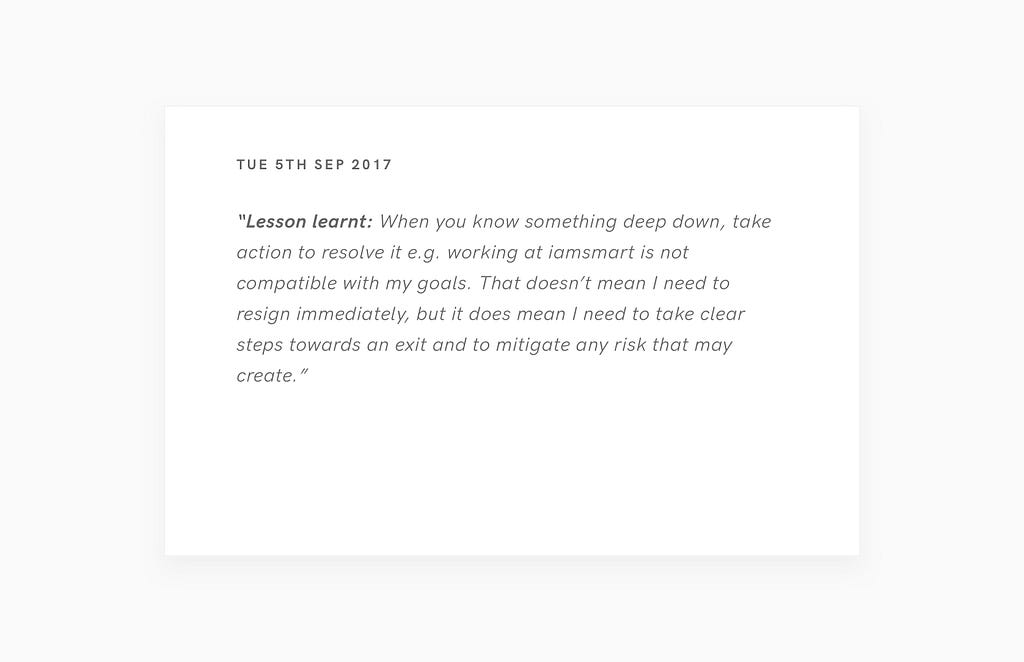
The catharsis from journaling that day brought me some inner peace.
But it also felt like a slap in the face.
It brought a sense of dread, of fear. It brought a concrete realisation that I would now have to leave. That I could no longer, having so clearly identified the root cause of my ills, carry on in that job.
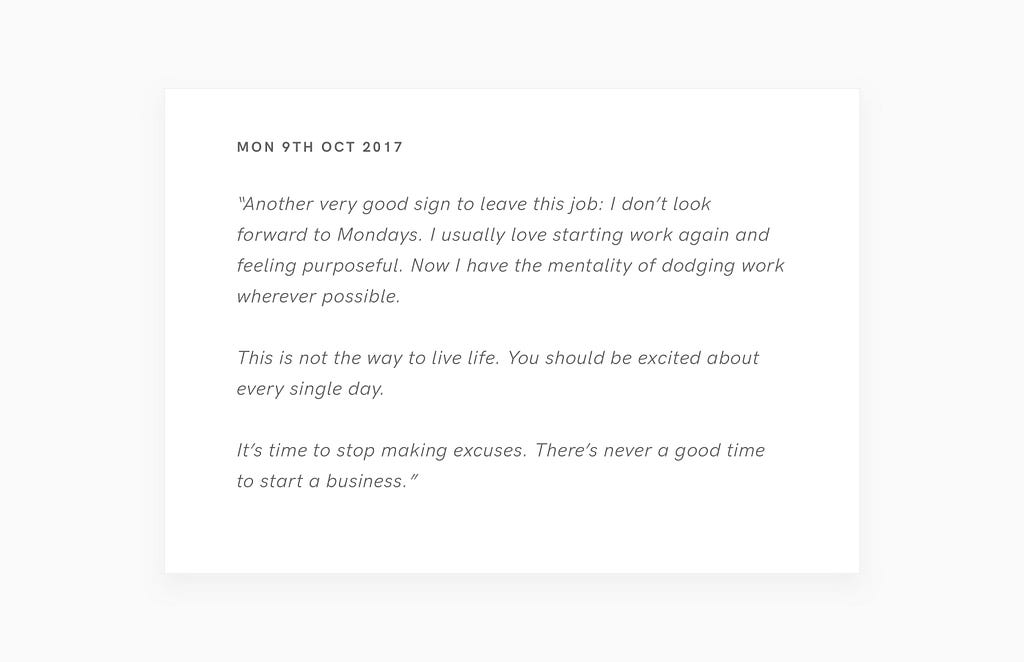
Journaling has consistently been shown to have a long list of benefits.
Studies show it clarifies our thinking processes, increases productivity, reduces stress, helps us recover from trauma, amongst many other things.
Yet, if it’s such a powerful habit, then you may ask yourself why I did not change my life sooner.
And to that I would say: when you hide from yourself, when you consistently act against your own interests to ignore some problem, you are deliberately working to undermine the clarity that journaling would normally bring to your life.
“The first principle is that you must not fool yourself and you are the easiest person to fool.” — Richard P. Feynman
We are all scared of something. Scared of judgment, scared of failure, scared of loss — of wealth, status, security.
We convince ourselves to do things which, in retrospect, we look back and laugh — or gasp — at.
We put ourselves through soul-destroying jobs, unhappy relationships, unpleasant experiences for years.
Yet journaling, even if it may take months (two, in my case), is the most effective way I have found to be accountable to yourself & your beliefs. To accelerate those big, scary decisions you know you should make, but try to ignore.

The key to starting to journal is not to worry about how to write or what to write. The key to it is patience & the relentless pursuit of slow, steady progress.
Recognise that you will not be writing War & Peace overnight — that it will be a life-long pursuit of improvement & experimentation.
Habit Formation“Excellence is an art won by training and habituation. We do not act rightly because we have virtue or excellence, but we rather have those because we have acted rightly. We are what we repeatedly do. Excellence then is not an act, but a habit.” — Aristotle
B.J. Fogg, a Stanford professor & expert in habit formation, suggests approaching any new habit methodically & using behavioural psychology to ensure success.
He suggests the following:
Start very small
We tend to be impatient. This means we try to write 1,000 words on our first day. Yet when we then fail to meet this ambitious goal on day two or three, we give up.
Therefore, to ensure consistent progress, aim to just write one word a day or do one push-up every morning for week one.
The key here is that habits take time to form — 66 days according to a UCL study. Your initial objective is therefore consistent repetition before working on the actual substance of the habit.
2. Tie it to an existing habit
Remembering to do something new consistently on a daily basis is very difficult. In fact you will just inevitably forget without creating a trigger.
The most effective trigger to remind you to perform the habit is an existing habit.
If, for example, you want to start flossing, place your floss next to your toothbrush. When you brush your teeth every morning, you will see the floss & practice the new habit.
If you wish to journal with a notebook, then place the notebook in the middle of your desk every morning.
If you journal digitally, keep your journaling app open at all times, so it’s visible, and make journaling the first thing you do when you flip your laptop open in the morning.
(You know the 80% of people that fail their New Year’s resolution by week 1? Those are the people that completely ignore — or don’t know about — the behavioural psychology behind habit adoption.)
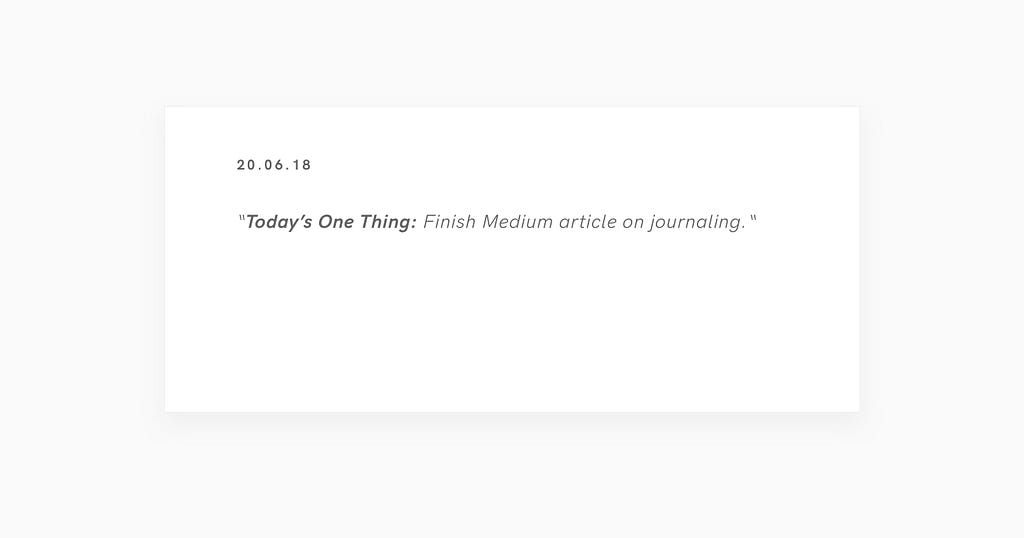
Download a digital writing app, such as Scribe or OmmWriter.
Identify your existing habit to trigger you to journal, then start small by writing down one thing to acheive that day.
I’ve always used to-do lists, but focusing on one single priority task means that you can finish every day as a success. I also find that you very quickly realise most of your time is spent on low-impact tasks, so prioritising like this is a highly effective way to impact your own life, as well as to quickly see the benefits of this simple journaling format.
Gary Keller, author of the Wall Street journaler bestseller ‘The ONE Thing’, identified that, behind the vast majority of top performers, they all prioritise effectively by having one main area focus.
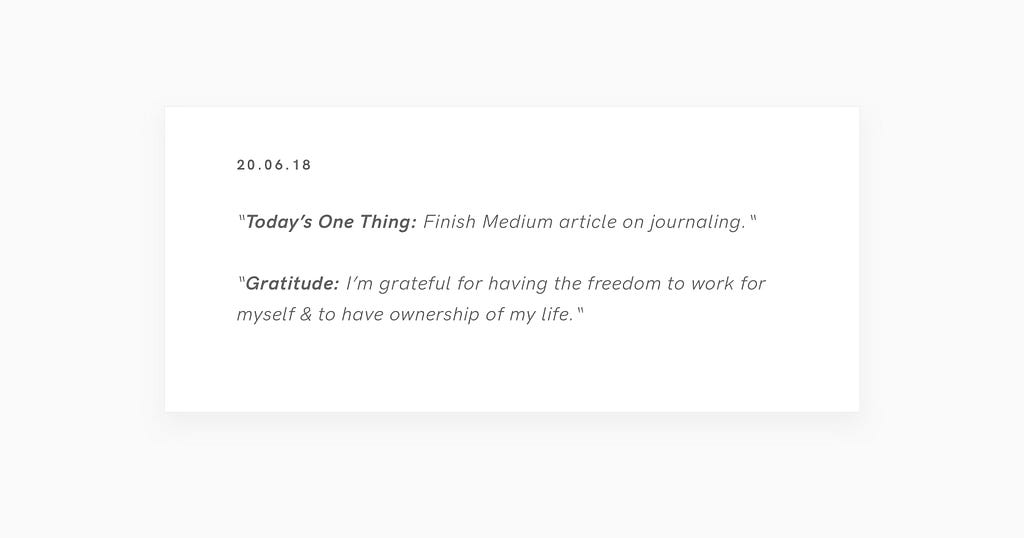
After 30 days, your journaling habit will be starting to strengthen. Avoid the temptation of trying to do much by free-flow writing, however.
Gratitude has been shown to strongly & consistently increase happiness. Therefore, below your ‘One Thing’, simply write down one thing to be grateful for today.
A few years ago, I would have laughed at the idea of writing things I’m grateful for, particularly something so simple as ‘a sunny morning’. However, after looking at the science & seeing the impact in my own much more positive approach to each & every day, this practice is a cornerstone of my daily journaling habit.
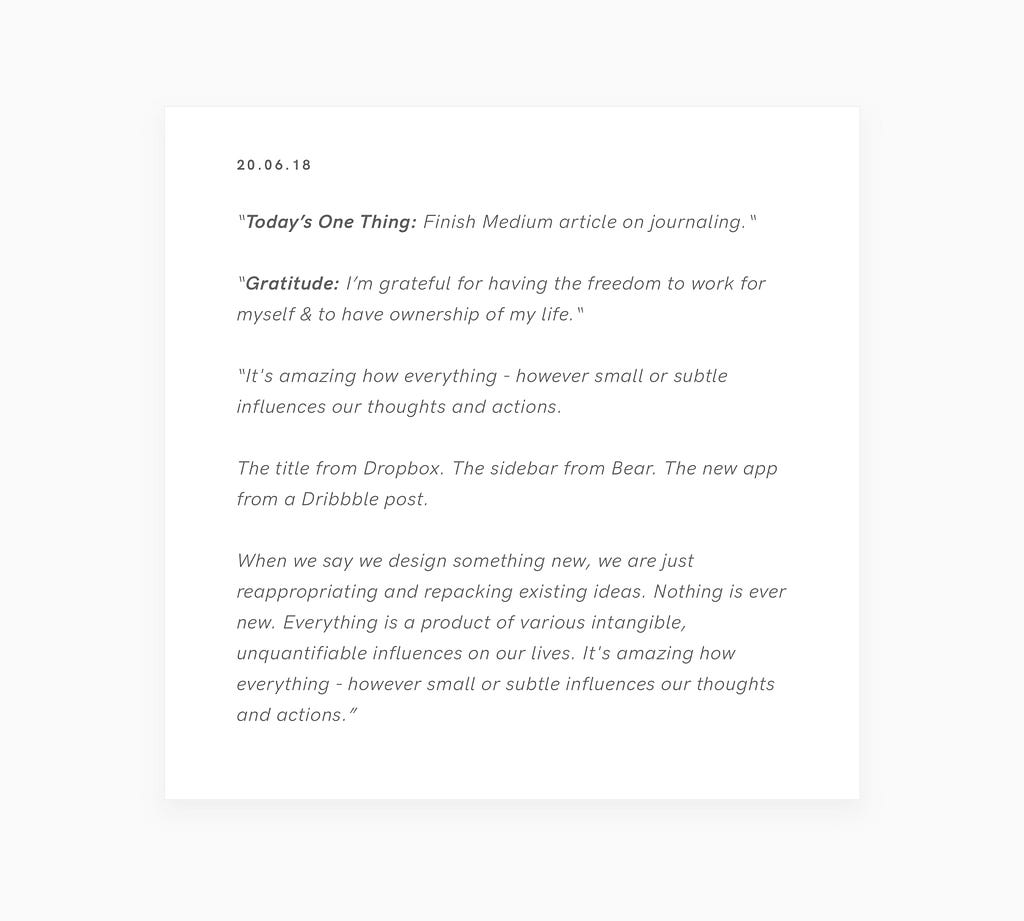
Now that you’ve completed 60 days of micro-journaling, you can start to experiment by setting your creative side free. Write about anything and everything, however seemingly irrelevant.
I started free-flow writing with no idea how to start. The first few days you write something mundane about your day. A week or so after you may go deep on an idea or a problem you have. Just keep at it for a few weeks & you’ll start to see your writing evolve.
After four years of journaling & easily over a million words, this free-flow writing habit has evolved into me contributing articles regularly on design, entrepreneurialism & lifestyle design on Medium, with many of these articles emerging from my free-flow journaling in the mornings.
Month 4 onwards:
“Writing is an exploration. You start from nothing, and learn as you go.” — E.L. Doctorow
At this point, by focusing on consistency, you should have habitualised journaling, as well as recognising the power of best practices for habit formation.
The next step is up to you. Read widely, experiment monthly, learn & discover what works for you.
The key with journaling is that there is no right way to approach it. Some use paper, others use apps. Some write about anything, others follow a structure.
Just remember that journaling is a process, one that will continue for the rest of your life. Embrace that sense of discovery that comes with that knowledg.e
I’ve tried endless ways to journal, but have settled on what works for me at this moment in time. In the future I’ll add to it, I’ll take things away, but the habit will always remain.
At the moment I define one priority for the day, one lesson learnt, one thing to be grateful for, three new ideas, a to-do list & around 500 words of free-flow writing.
Conclusion“When you can write well, you can think well” — Matt Mullenweg
The key with journaling is that there is no right way to approach it. Some use paper, others use apps. Some write about anything, others follow a structure.
Just remember that journaling is a process, one that will continue for the rest of your life. Embrace that sense of discovery that comes with that knowledge.
Remember to be patient, that your writing will not improve overnight.
But, if you want to radically improve your decision-making, your mental clarity, your happiness even, then it’s worth the wait.
ProWritingAid is a powerful suite of over 20 different writing and editing tools. Copy your draft into their online editor and check grammar, sentence flow, overused words, and more. Try it for free!

How To Save Yourself Years of Bad Life Decisions was originally published in The Writing Cooperative on Medium, where people are continuing the conversation by highlighting and responding to this story.
Read more: writingcooperative.com